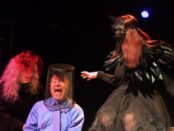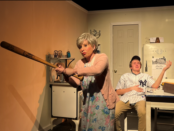Rawshock
"Rawshock" is a powerful, insightful, compelling play that lays bare the craven manipulation of corporate healthcare in the name of profits. It is beautifully written by Rita Lewis and superbly directed by Ken Wolf, who also did the lighting and sound design. It is a story about a group of patients in a psychiatric hospital setting and what happens to them when the new corporate owners of the hospital disrupt their therapeutic group. It is a gem of a show with outstanding performances that should not be missed by anyone who enjoys solid dramatic theater. [more]








